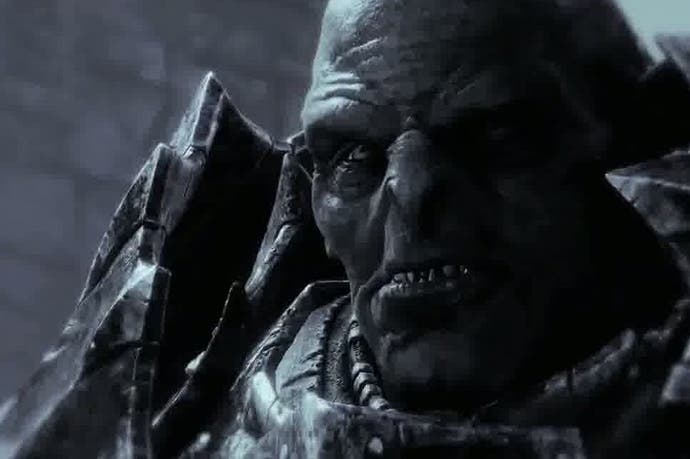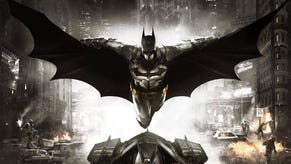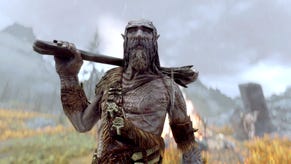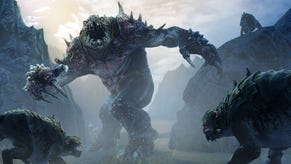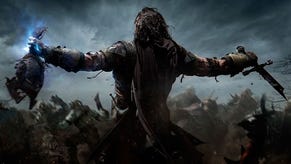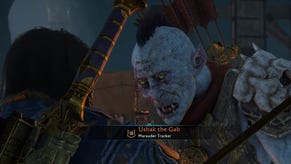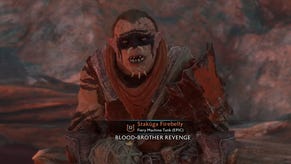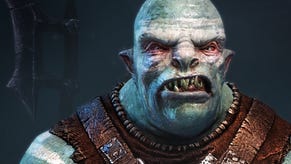Shadow of Mordor is wise to focus on the baddies
World of warchiefs.
Middle-earth: Shadow of Mordor is a delight. It's also one of the most derivative games I've ever played. And this feels a bit confusing, really. Some of us spend a fair amount of time worrying about the steady convergence of so many big-budget blockbuster games into one hyper-dense open-world singularity of levelling, stealth kills, rhythmic combat and map-unlocking. And then something like Mordor comes along and fits this profile perfectly - something that takes the iterative template laid down by publishers like Ubisoft in particular and cranks it up to the point of parody. And yet somehow, the end result is, well... Somehow, the end result is a delight.
I think the whole thing makes a little more sense if you flip the argument around, of course. If you'd told me, four or five years ago, in the midst of all the heavily-scripted, QTE-fetishing, cover-hugging set-piece-fumbling cinema games, that in 2014, your typical triple-A title would be played out across the wild expanse of a huge map and would be driven more by the emergent hilarity that spilled from its environments and its systems than the machinations - the deus ex machinations ha ha! - of its narrative designers, I probably would have been overjoyed. Mordor slots into that way of thinking quite handily. If this is where we've been aiming of late, now that we're actually here, it's not bad at all.
The problem with this theory, though, is that not all of the games converging on this spot are as entertaining as Mordor. The basic template itself is not enough. On paper, for example, there's not so much separating Mordor from something like Watch Dogs (and granted, Eurogamer gave both games pretty similar scores). Personally, though, I find Watch Dogs a bit of a witless chore: all those icons spread over that massive city and it just feels more like tidying up than exploring. Mordor's own locations are pretty big as well, and as the game progresses, they too start to fill with mission markers and side quests and all of the same sorts of things Watch Dogs trades in. Suddenly, though, I'm happy to muddle through, and I'm happy to dawdle and give in to distraction. What marks Mordor out?
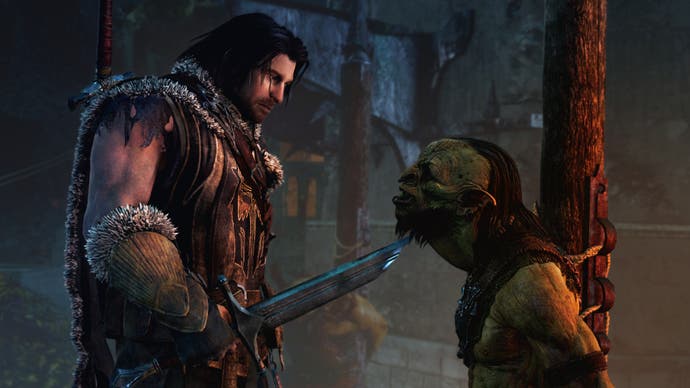
On the surface, there's doesn't seem to be much to mark it out at all. Its storyline feels rather carelessly implemented (your wife's been killed; now get outdoors and have some fun!), the open world initially seems drab and unmemorable, part Dr Who quarry, part poorly-tended school sports field, and the sheer extent of the game's borrowings seem likely to overwhelm it. The pitch is Assassin's Creed meets Arkham City, in essence - the clambering and map-unlocking of one, the magical mob-happy combat and aggressive predator stealth of the other.
As I write that, I realise that Assassin's and Arkham were already pretty similar as it is. Move in close, though, and Mordor's willing to pinch things that are really quite specific. You open up new parts of the map by climbing towers dotted around the place and essentially synchronising just as in Assassin's. Meanwhile, you have the Tolkien equivalent of Batman's detective mode for tracking people by their shimmering footprints. Individual elements of the combat have direct parallels in both earlier games, and you can even approach Mordor's skill tree as a kind of mix-and-match design document: that move from the Dark Knight, thanks, and that one from good old Ezio.
I think the Mordor difference, though, comes down to focus. This is a game whose true stars only become apparent over time. You may be cast as a ranger, blandly dashing and pierced, unconvincingly, by the barbs of recent tragedy but it's actually the spirit of the orcs he fights against that is particularly strong here. Buffoonish and brutal by turn, they're your main enemy in the game, and they slowly permeate every inch of the design until they overwhelm it. They fight amongst themselves in endearingly bloodthirsty ways, and they say amusing things to each other while you're crouched in the bushes waiting to gore them. I was waiting to gore one of them just the other day, in fact, and he suddenly turned to his friend and said, "I set myself on fire by accident this morning." Maybe that wasn't exactly the line, but it was the gist of it, and who really writes down anything an orc says, anyway?
The important thing, I think, is that Mordor's emergent silliness is built around these guys. Mordor knows that the Men of Gondor are a bit dull, the elves and dwarves are a drag to the uninitiated, and the hobbits are far too tweedy for most of us to get genuinely excited about. Forget the handsome fool you're actually cast as, in other words, because the designers did long ago. They know that Mordor is an orc game where it matters, and while the subtext can be a little weird at times (it's odd to play Mordor in modern Britain, where you're essentially a lone member of the aristocracy picking away at everyone else because you're afraid they're starting to organise themselves) an orc game is still a pretty magical thing to behold.
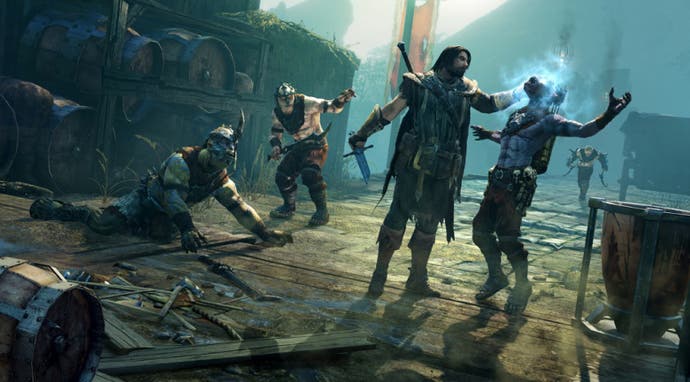
And it's as an orc game, in fact that Mordor actually reaches beneath its scattered inspirations and adds something of its own, too. It's something that really lies at the heart of the systems the fun is constructed around. Watch Dogs' hacking is fun, and Far Cry 4's new menagerie looks gloriously deadly, but these are all elements that sit on top of a game's world and offer a likable patina of embellishment. Instead, Mordor reaches right down to the centre of the game and presents a weirdly engaging simulation of orc hierarchy. This is the Nemesis system, and, given that Mordor's a game about infiltrating orc command and raising an army of your own within it, you won't be able to play for more than ten minutes at a time here without engaging in it in some way.
Missions, for example, are frequently created from it, as you pit one captain against another or weaken a general by thinning the ranks of his underlings. Just wandering the map will throw you up against people you've fought before, too - people who remember the specific battle in question because they got promoted when you died. Whenever you die, in fact, you're in for a bit of a treat, as you return to the stark tactical expanses of the Sauron's Army menu where you watch the shufflings in and out of orc persona that have been kicked off by your temporary defeat. You could argue about how much difference there really is between fighting one general and fighting another - although the lattice of strengths and weaknesses each one brings with them certainly gives things a tangible depth - but there's no questioning the way that the nemesis system delivers a game world that feels wild and alive and reactive right to its very core. A world that bucks underneath you as you go about your stoical heroics. A world that offers you Borgu Grog-Drinker, for example, whose fat face is squashed into a helmet that looks like a primitive chimney, complete with pouring smoke, and whose motives include "cutting, slicing, and laughing." A world that offers you Ugakuga Head-Chopper, who has human skulls spiked neatly on each shoulder. I think I went to school with this guy.
Big budget games, as popular wisdom has it, are increasingly big bets for the people who make them. That suggests a degree of conservatism, which Mordor, with all its tried and tested elements, certainly possesses. Thankfully, it's chosen to counter that conservatism by building itself around a cast of punkish lunatics who can't help but create madness wherever they go. If you're splashing time and effort and money on a huge emergent game, Mordor suggests you might as well give in to the madness as soon as you can. Whatever your setting, whatever your narrative, you have to let the wild things in.
